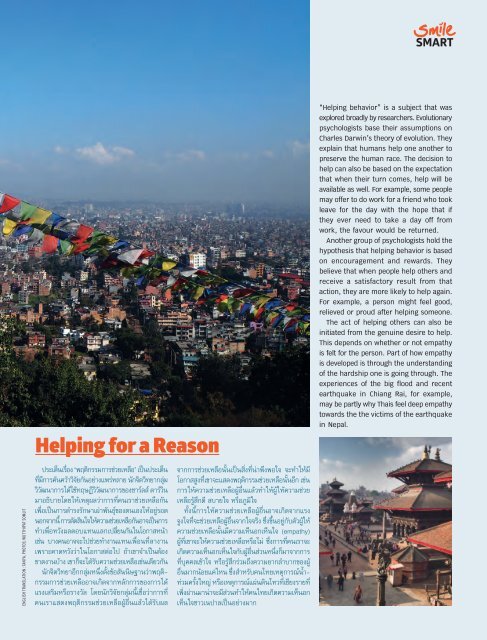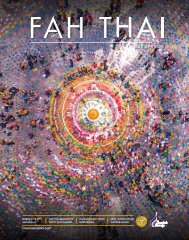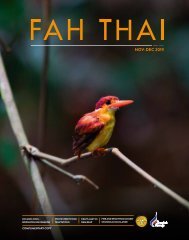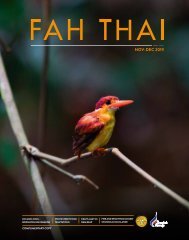WE Smile Magazine June 2015
The In-Flight Magazine of Thai Smile Airways
The In-Flight Magazine of Thai Smile Airways
Create successful ePaper yourself
Turn your PDF publications into a flip-book with our unique Google optimized e-Paper software.
SMART<br />
ENGLISH TRANSLATION : TANYA, PHOTOS: WUTTHIPAT SOMJIT<br />
Helping for a Reason<br />
ประเด็นเรื่อง ‘พฤติกรรมการช่วยเหลือ’ เป็นประเด็น<br />
ที่มีการค้นคว้าวิจัยกันอย่างแพร่หลาย นักจิตวิทยากลุ่ม<br />
วิวัฒนาการได้ใช้ทฤษฎีวิวัฒนาการของชาร์ลส์ดาร์วิน<br />
มาอธิบายโดยให้เหตุผลว่าการที่คนเราช่วยเหลือกัน<br />
เพื่อเป็นการดำารงรักษาเผ่าพันธุ์ของตนเองให้อยู่รอด<br />
นอกจากนี้การตัดสินใจให้ความช่วยเหลือกันอาจเป็นการ<br />
ทำาเพื่อหวังผลตอบแทนแลกเปลี ่ยนกันในโอกาสหน้า<br />
เช่น บางคนอาจจะไปช่วยทำางานแทนเพื่อนที่ลางาน<br />
เพราะคาดหวังว่าในโอกาสต่อไป ถ้าเขาจำาเป็นต้อง<br />
ขาดงานบ้าง เขาก็จะได้รับความช่วยเหลือเช่นเดียวกัน<br />
นักจิตวิทยาอีกกลุ ่มหนึ ่งตั ้งข้อสันนิษฐานว่าพฤติ-<br />
กรรมการช่วยเหลืออาจเกิดจากหลักการของการได้<br />
แรงเสริมหรือรางวัล โดยนักวิจัยกลุ่มนี้เชื่อว่าการที่<br />
คนเราแสดงพฤติกรรมช่วยเหลือผู้อื่นแล้วได้รับผล<br />
จากการช่วยเหลือนั้นเป็นสิ่งที่น่าพึงพอใจ จะทำาให้มี<br />
โอกาสสูงที่เขาจะแสดงพฤติกรรมช่วยเหลือนั้นอีก เช่น<br />
การให้ความช่วยเหลือผู้อื่นแล้วทำาให้ผู้ให้ความช่วย<br />
เหลือรู้สึกดี สบายใจ หรือภูมิใจ<br />
ทั้งนี้การให้ความช่วยเหลือผู้อื่นอาจเกิดจากแรง<br />
จูงใจที่จะช่วยเหลือผู้อื่นจากใจจริง ซึ่งขึ้นอยู่กับตัวผู้ให้<br />
ความช่วยเหลือนั้นมีความเห็นอกเห็นใจ (empathy)<br />
ผู้ที่เขาจะให้ความช่วยเหลือหรือไม่ ซึ่งการที่คนเราจะ<br />
เกิดความเห็นอกเห็นใจกับผู้อื่นส่วนหนึ่งก็มาจากการ<br />
ที่บุคคลเข้าใจ หรือรู้สึกร่วมถึงความยากลำาบากของผู้<br />
อื่นมากน้อยแค่ไหน ซึ่งสำาหรับคนไทยเหตุการณ์น้ำา-<br />
ท่วมครั้งใหญ่ หรือเหตุการณ์แผ่นดินไหวที่เชียงรายที่<br />
เพิ่งผ่านมาน่าจะมีส่วนทำาให้คนไทยเกิดความเห็นอก<br />
เห็นใจชาวเนปาลเป็นอย่างมาก<br />
“Helping behavior” is a subject that was<br />
explored broadly by researchers. Evolutionary<br />
psychologists base their assumptions on<br />
Charles Darwin’s theory of evolution. They<br />
explain that humans help one another to<br />
preserve the human race. The decision to<br />
help can also be based on the expectation<br />
that when their turn comes, help will be<br />
available as well. For example, some people<br />
may offer to do work for a friend who took<br />
leave for the day with the hope that if<br />
they ever need to take a day off from<br />
work, the favour would be returned.<br />
Another group of psychologists hold the<br />
hypothesis that helping behavior is based<br />
on encouragement and rewards. They<br />
believe that when people help others and<br />
receive a satisfactory result from that<br />
action, they are more likely to help again.<br />
For example, a person might feel good,<br />
relieved or proud after helping someone.<br />
The act of helping others can also be<br />
initiated from the genuine desire to help.<br />
This depends on whether or not empathy<br />
is felt for the person. Part of how empathy<br />
is developed is through the understanding<br />
of the hardship one is going through. The<br />
experiences of the big flood and recent<br />
earthquake in Chiang Rai, for example,<br />
may be partly why Thais feel deep empathy<br />
towards the the victims of the earthquake<br />
in Nepal.

















